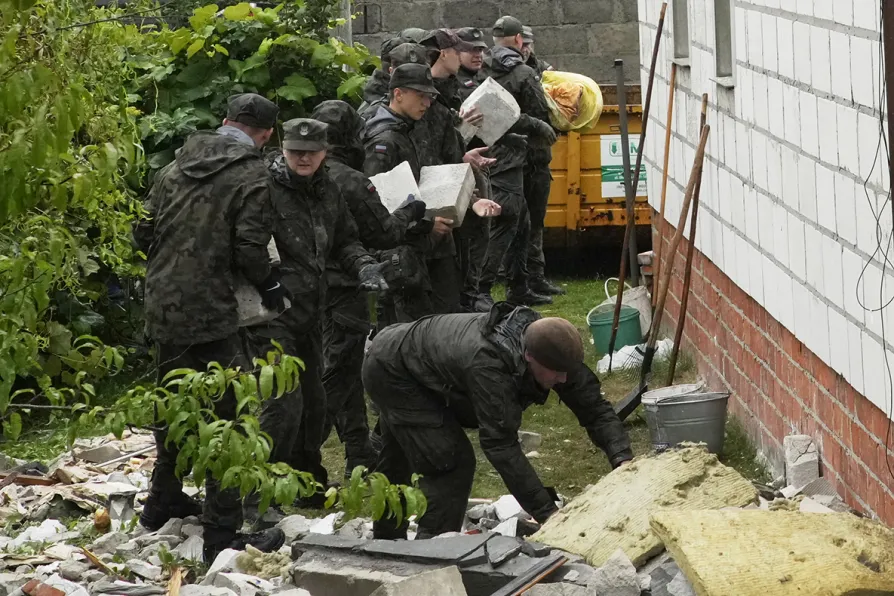A survey circulated by a far-right-linked student group has sparked outrage, with educators, historians and veterans warning that profiling teachers for their political views echoes fascist-era practices. FEDERICA ADRIANI reports
MARK HAZELDEN criticises the Western narrative that the incident was an escalation of Russia’s confrontation with the West, given that Belarus, a Russian ally, warned Poland of off-course drones, and the drones were unarmed, cheap wooden decoys

 Territorial defense officers clean up debris from the destroyed roof of a house, after multiple Russian drones struck in Wyryki near Lublin, Poland, September 11, 2025
Territorial defense officers clean up debris from the destroyed roof of a house, after multiple Russian drones struck in Wyryki near Lublin, Poland, September 11, 2025
THE curious case of the Russian “drone attack” on Poland on the night of September 9-10 involved a double misdirection: firstly, of the flight path of the drones themselves, and secondly, of public perception. Both of these were instigated by Ukraine and its Nato sponsors.
Western politicians and media, unwilling to cast doubt on the claims of deliberate incursion into Poland by Russia, have concealed or downplayed anomalous features of the incident.
Key among these is that the Belarusian military gave Polish forces advance warning of drones which they had detected as having gone off track, a number of which were headed towards Poland.
Given that Belarus is one of Russia’s closest allies, this is incongruous with the narrative of a Russian “attack” or “probe” against Poland.
Not only that, but according to the Belarusian military, these drones had been diverted due to electronic warfare — with the clear implication that it was Ukrainian forces that had interfered with the flight path of the Russian drones.
As the Belarusian defence ministry stated: “Belarus notified Poland and Lithuania about the drones that approached their territory,” quoting military chief of staff Major-General Pavel Muraveiko: “As the Russian Federation and Ukraine exchanged blows using unmanned aerial vehicles this night, duty forces and assets of the air defence system of the Republic of Belarus constantly monitored the unmanned aerial vehicles that veered off course due to electronic jamming from both sides.”
This had “allowed Poland to promptly respond to actions of the drones by scrambling its own duty forces.”
Muraveiko added that some of the stray drones had been destroyed by the Belarusian air defence forces above the country’s territory.
For their part, the Polish forces “informed the Belarusian combat duty units about the approach of unidentified aerial vehicles from Ukraine’s territory to the border of the Republic of Belarus.”
Muraveiko commented that “sharing information about the aerial situation is an important component in efforts meant to ensure security in the region as a whole and helps establish trust and reinforce security.”
September 9-10 was a night of extensive drone flights from both sides in the war between Russia and Ukraine, with both also engaging in counter-drone electronic warfare. Notably, none of the Russian drones which arrived in Polish territory were found to contain any explosives.
All of them were cheap decoy UAVs made from plywood and foam, known as Gerberas, which are used to distract air defence systems and thus help the warhead-equipped drones and missiles reach their targets.
Given their cheapness of manufacture, it is unlikely that the Gerbera drones were fitted with equipment to protect them from electronic interference, hence their vulnerability to being led astray by Ukrainian electronic warfare.
Also ignored by Western media, a Polish military statement in response to the information sharing by Belarus struck a different tone from the bombastic declamations of the Ukrainian, Polish, and other Nato politicians.
As reported by Polish news network TVP World, the chief of Polish general staff General Wieslaw Kukula, said the advance warning from Belarus was “helpful for us” but somewhat “surprising,” given Belarus’s support for Russia in the war in Ukraine, and tensions along the border with Poland.
“The Belarusians warned us that drones were heading towards us through their airspace,” the general said, adding that Poland accepted the tip-off and reciprocated by sharing information about objects flying towards Belarus.
Kukula commented thoughtfully: “It was surprising to me that Belarus, which is really trying to escalate the situation on our land border, decided to co-operate in this way.”
But for the Western leaders and tame media, there can be no such consternation. When the facts are at odds with a narrative that promotes military build-up and escalation, the response is not to question the narrative, but to ignore the facts.














